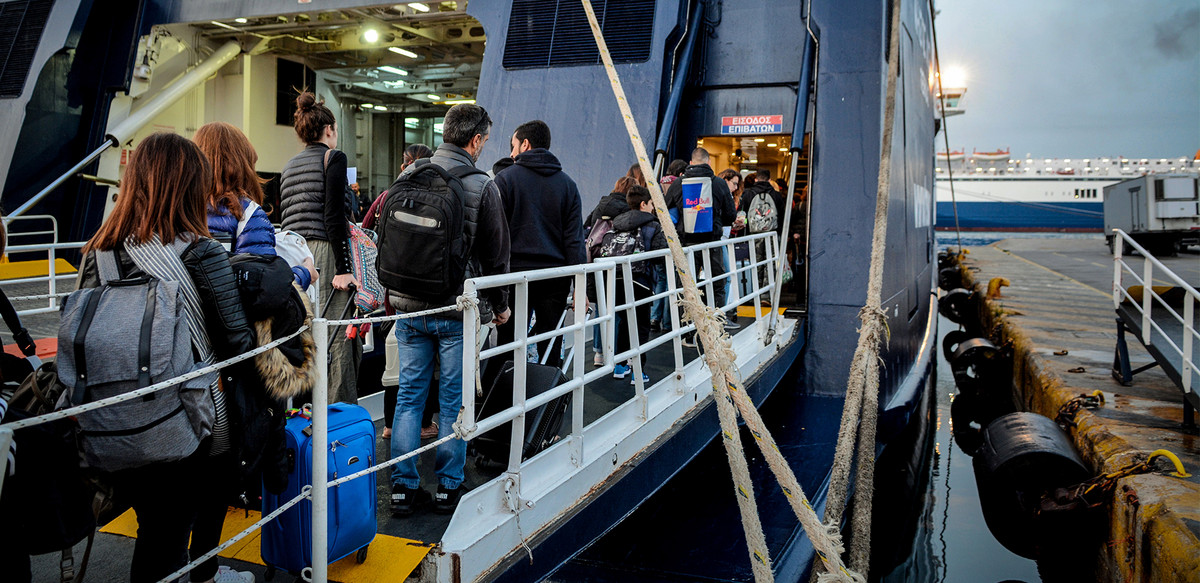
At noon on Tuesday (7/3) Shipping Minister Yiannis Plakiotakis visited Maximos Palace with Coast Guard Chief Giorgos Alexandrakis. The decision was taken in their meeting with the Prime Minister Intensification of security controls and inspections on ships considering the tourist season. This is the last thing anyone wants train accident of TempoThis will be a sad experience for the victims at sea.
The issue, however, is that the legislative framework relating to checks to be carried out on the country’s coastal shipping fleet is clear and up-to-date, so all that is required in practice is word-by-word application. arrangements. But does such a thing happen? Are our ships safe?
Group coaching and training for every occasion
Theoretically, Ship crews are required to undergo training at regular intervals. Assembling drills at pre-determined locations on board in case of alarm, abandon ship drills if necessary, fire-fighting drills, confined space entry and rescue drills, use of life-saving equipment and continuous drills should be recorded. In prescribed register book vessels. If the exercise is not carried out in full or is postponed, it must still be reported. Now we need to check that all these are done.
Obligations of the ship owner before the ship are unrestricted
At the same time, before starting the voyage, the ship owner is obliged to:
- Ensuring that all necessary maritime documents are on board as per applicable regulations, certificates for safety and security of marine environment and class certificate of recognized classification society.
- According to the rules in force, his civil liability covers from claims that have a cause or cause for loss of life or bodily injury or loss or damage to a thing that happened on or directly related to a ship. Operation of a ship in insurance companies or mutual insurance companies or financial companies.
- Use of electronic reservation of seats, passenger tickets and receipts for vehicular transport, as well as registration of passengers as per the rules now written.
Confusion over electronic tickets
In e-ticketing, the system is backward, which was evident even before the pandemic period. In theory, ferry companies should keep a detailed list of the number of passengers on each route and their details. However, in practice, such a thing does not happen, as those who have sailed even once in recent years know this.
When you go to the counter to pay the ticket, they ask you to write your name on it, but they don’t ask for your ID to confirm the truth of what you say.. This means you can declare any name you want. It goes without saying that you can go and issue tickets to your entire company, even in this case no identification will be made. You can only mix names. The same applies to e-tickets. No sign there either, just enter your name in good faith.
In our research, we found that even a popular online ticket website had this to say: “Identification at boarding is not as meticulous as at airports” And how it’s only very meticulous when it comes to “discounted ticket holders (eg students)” because there they have to check the pass held by the student so that they can confirm that they are indeed eligible for the discounted ticket. . In other words, it is not a matter of safety and compliance, but financial gain.
Average age of passenger ships is 27 years
As is well known, we are a great seafaring nation that transports hundreds of thousands of travelers every year to the Aegean, Ionian and Crete islands, especially during the summer months. So ship owning companies can expect to have newly built hulls that meet all modern safety systems. If you ask the ship owners, they will say that they take all necessary measures for a safe voyage. However, this can only be confirmed in practice by competent government agencies. If one thing is self-evident, it’s the age of each boat.
According to the Panhellenic Union of Merchant Mariners (PENEN), we have an aging coastal shipping fleet., has forced the withdrawal of many ships ferrying people to the islands in Greek waters due to inadequate maintenance. Currently 70% of these ships are over 20 years old, with an average fleet age of 27 years!
Further, A significant number of vessels are over 35 years old, which includes most ships in public service (barren line ships) and is subsidized by the Greek government to the tune of 140 million euros per year. Barren routes for example Rhodes – Chalki – Karpathos – Kasos – Sitia, Symi – Rhodes, Patmos – Fornoi – Ikaria (Agios Kyrigos) or Samothraki – Lemnos.
The last major modernization was in the 1995-2005 decade
The decade 1995 – 2005 saw the last major modernization and renewal of the coastal shipping fleet. Since then, new ships have been added by companies we all know, but not enough to replace the associated interactions. Old ones.
Last summer, PENEN pointed out in its announcement that the recorded data not only shows that the state of the fleet is not good, but also sends a clear message that “we are returning with rapid steps to previous decades.” 1980 – 2005, when various problematic and ill-maintained ships of the type “ROMILDA”, “DIMITRA”, “NAIAS EXPRESS”, “SAMINA” and many other “icons” were in the middle. Coastal ships running on different routes and passengers struggled to reach their destination, breaking down (usually mechanical problems). When did these start? Port of Piraeus And no traveler knows when he will reach his destination.”
Due to lack of maintenance it is constantly falling into disrepair
The Panhellenic of Merchant Marines also complains that, in addition to an aging fleet, ships suffer frequent and repeated mechanical and other breakdowns, “We must also underline the inadequate maintenance of the ships.”. This situation is expected to worsen dramatically in the coming years. It is no coincidence that every summer we hear of a liner breaking down, hundreds of passengers suffering and long delays in reaching their destination.
In fact, last August, when a ship from Piraeus to Heraklion suffered mechanical problems off Crete, the company decided to open a free bar to quell the passengers’ anger, and passengers who arrived at the port 4.5 hours late were entitled to a 50% discount on their next passage.
How many lifeboats should there be?
In terms of lifeboats (or small lifeboats) and life preservers, there is a prescribed number for all ships mentioned by the connoisseur and a corresponding number is made each season. However, the question that arises is whether everything is in good shape and to what extent the old ones have been replaced. According to regulations, lifeboats are distributed as evenly as practicable on both sides of the ship.
Yes yes Lifeboats should be able to accommodate 110 – 120% of the total passenger capacity.If one lifeboat is lost or disabled, the remaining ones will be sufficient to carry all persons.
As for life jackets, the rules state that “a number of child-friendly life jackets equal to at least 10% of the number of passengers shall be provided”. One life jacket for each child’ and ‘the number of life jackets suitable for children of at least 2.5% or more of the number of passengers traveling on the aircraft so that one life jacket is available for each child’ .
with A circular life preserver with at least one lifeline length should be provided on each side Minimum draft or 30 meters (whichever length is greater) shall be equal to less than twice the height of the stack above the waterline. If a person is found on board, it is used to let the crew off the deck.
Also take care of warning systems
The European regulation, incorporated into national law, specifies that ships must have an alarm system and meet certain specifications so that passengers and crew can be called to assembly stations if necessary. “General alarm systems sound in all living quarters, in areas where employees normally work and on all open floors,” it says.
And the announcement system should be a complete loudspeaker installation allowing simultaneous transmission of messages in all areas. It should allow messages to be sent from the ship’s bridge, as well as from any other points, “at the discretion of the ship’s flag state authority”. The public address system is protected against unauthorized use, ambient noise must be clearly audible in all areas, and distress messages must be able to be transmitted even if the loudspeaker fails.
It goes without saying Every ship must have, among other things, combustion, modern radio communication equipmentFire fighting systems and emergency plans and plans for hazards including fire, all types of damage, pollution, dealing with illegal activities threatening the safety of the ship, passengers and crew and providing assistance to other ships that may be in danger.

. “Professional creator. Subtly charming web advocate. Unapologetic problem solver. Devoted student.”





More Stories
African dust recedes: Scientists find – experts warn
African Dust: Ministry of Health Recommendations and Precautionary Measures – When the Atmosphere Clears
Plato's exact burial place is located